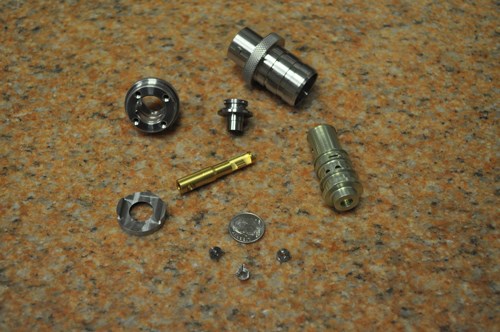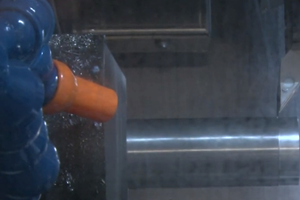Turn-Mill Center Aids Shop through Recession
Bryan Cardon chose multitasking as the solution to improve his shop’s workflow. He reduced cycle times and leadtimes for his customers in his Ogden, Utah, machine shop after implementing the Ganesh 32CS seven-axis, twin spindle, turn-mill center. The company also gained new customers and jobs because of this new machine and its capabilities.
Multitasking is a skill that most shop managers wish they could improve upon, both personally and professionally. More work would be completed in a day if multitasking was easy. Bryan Cardon knew this was true when he chose multitasking as the solution to improve his shop’s workflow. He reduced cycle times and leadtimes for his customers in his Ogden, Utah, machine shop after implementing the Ganesh 32CS seven-axis, twin spindle, turn-mill center. The company also gained new customers and jobs because of this new machine and its capabilities.
“We always look to technology and come up with other innovative ways to make products more efficiently,” says Mr. Cardon, general manager, Innovative Precision, LLC. “We do a lot of parts with multiple setups that require both turning and milling. We were spending a lot of time setting up various machine tools for all these operations.”
Since its opening in 1998 with an EZ Trak knee mill and a small manual lathe, Innovative Precision has prospered. It established itself as a quality shop with quick turnaround and competitive pricing, specializing in precision machined parts for a variety of industries, including aerospace, defense, military, automotive, medical and more. Mr. Cardon began the business by himself, but since then has added 19 more employees and thrives on keeping them happy and well trained.
Many types of machines, of course, had to be purchased in order to succeed the way this shop has. The new Ganesh turn-mill machine joins a family of seven CNC lathes; 14 CNC mills including three four-axis mills and several two- and three-axis mills; two HMCs; a multitasking machining center; and five CNC lathes (two equipped with live tooling).
Turned On to Turn-Mill
To continue with its success, the company’s problem of too many setups needed to be addressed. Before purchasing the Ganesh turn-mill, Mr. Cardon looked at various types of multitasking equipment and screw machines. “We found that most of these machines have a guide bushing that requires precision ground stock,” Mr. Cardon says. “This was not necessary for the parts we needed to produce. We looked for dual-spindle multitasking equipment that would allow us to complete multiple turning and milling operations in one cycle.
So when we looked at the Ganesh machine, we were very impressed with its capabilities. These machines are built with top of the line components, and the people at the company are some of the most genuine people you will ever meet. They truly understand that their success relies on the success of their customers.”
With the new machine, the company is able to produce parts with multiple operations very efficiently. In fact, one part in particular has been able to be produced in a third of the time on the new turn-mill. “We have one part that requires two turning operations and two milling operations,” Mr. Cardon says. “These used to be done in a single-piece flow, tying up two CNC lathes, a CNC mill, and two machinists (one to run the lathe and the other to run the mill). Four setups were needed. Now, we have one setup on one machine running partially unattended.”
The other machine tools that were previously working to produce this part are now freed up for work that is more suited for them. Also, two machinists are now available to work on other shop projects.
What Recession?
The turn-mill center has also created opportunity for Innovative Precision to broaden its scope of machining capabilities to both existing customers and new customers. “On existing parts, we’ve been able to make them more efficiently,” Mr. Cardon says. “The machine has also allowed us to bid on work that we wouldn’t normally be very competitive on and grow with it. There are certain customers that have had this kind of (multitasking) work, but because we never had a machine with this capability, we’ve never been able to do it until now.”
With the help of the new machine, the company was able to dodge much of The Great Recession’s negative effects. Although the company lost some customers over the last few years, other customers—existing and new—were able to fill the gap. Since implementing the new turn-mill in the spring of 2011, the shop has gained six customers. “One is now a huge customer of ours,” Mr. Cardon says.
The shop also earned its ISO and AS9100 certifications in 2009 amidst the recession, which has allowed the company to expand operations. “We added three machines, including the Ganesh turn-mill this year (2011), and we are going to put in three more by the end of this year,” he says. Also, a 6,500-square-foot addition to the building opened in 2011 to house the new machines.
When Quality is in Question
Innovative Precision’s “quality first” attitude is why its customers return and grow with the company year after year, according to Mr. Cardon. “We believe our employees are our single most valuable asset, which is why we invest so much time and effort into training our highly skilled staff. Every employee has a voice, and we listen to their ideas and continually improve and learn every day.”
Machinists at Innovative are trained to do their own programming, setups and operations—the entire process. Mr. Cardon believes the company benefits greatly by doing this. “You get a better product in the end, and you do away with finger pointing,” he says. “Part of the fun of being a machinist is being able to write programs and figure out how to make it better. We like the idea of giving people the freedom to make improvements and own the job.”
Also, quality control is easier to manage when one person is in charge of the process. Innovative Precision designs an in-process inspection plan for each project. Dimensions are inspected as parts are coming off of the machine based on its in-house sampling plan. “When we set up the machine the first part goes through our QC department and gets tagged. They do a full inspection at that point. From there we have certain things that are watched more closely throughout the process.”
‘Multi’ Material
The company runs a lot of stainless, mild steel, aluminum, tool steel and nitriding steels on its new Ganesh turn-mill center. “This is what we’ve run so far on that machine,”Mr. Cardon says. “If we haven’t used a material before, we find a way to use it.” This ability to use a variety of materials is yet another benefit of the multitasking machine. Not only does it reduce cycle times and leadtimes for the shop’s customers, but it can machine multiple kinds of metals.
The Ganesh turn-mill purchase has proven to be a positive move for Innovative Precision. It has helped retain customers and gain new ones through the recession and has made life easier on Mr. Cardon and the company’s machinists.
Benefiting from a strong quality control program, highly trained machinists, a new building addition and now a new Ganesh multitasking machine, Innovative Precision is traveling down the path as a thriving business.
Related Content
Reinventing the Wheel with Robot-Automated CNC Multitasking
One race team discovers how to efficiently manufacture a new wheel nut design for the next-generation NASCAR stock car with the help of a CNC mill/turn and a built-in robot.
Read MoreWhen a CNC Turn-Mill Doesn’t Turn
A shop in Big Sky Country uses a B-axis multitasking machine to produce complex, prismatic medical parts that require no turning complete from barstock.
Read MoreVideo Tech Brief: Twin-Turret, Twin-Spindle Lathe Machining
This machine model features roller linear ways to accommodate low-frequency vibration technology to minimize chip size.
Read MoreGetting More Production From Swiss Turning Centers
Buying a new CNC Swiss turning center is a substantial investment. For the best return, look closely for capabilities that enable the best utilization of the machine.
Read MoreRead Next
A Tooling Workshop Worth a Visit
Marubeni Citizen-Cincom’s tooling and accessory workshop offers a chance to learn more about ancillary devices that can boost machining efficiency and capability.
Read MoreSeeing Automated Workpiece Measurement in Real Time
User-friendly inspection software for CNC machining centers was shown at IMTS 2024 monitoring measurements between and after machining while performing SPC based on recorded measurement values.
Read More5 Aspects of PMTS I Appreciate
The three-day edition of the 2025 Precision Machining Technology Show kicks off at the start of April. I’ll be there, and here are some reasons why.
Read More












.jpg;maxWidth=300;quality=90)











